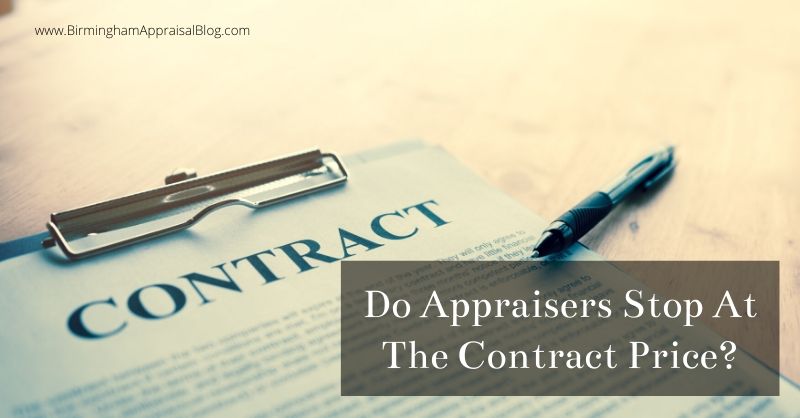Can A Home Be Worth More Than The Contract Price?
 While doing an appraisal this week I was asked a question by the homeowner. It is one I have been asked before so I thought I would go ahead and write a post about it.
While doing an appraisal this week I was asked a question by the homeowner. It is one I have been asked before so I thought I would go ahead and write a post about it.
Her question was this: When doing an appraisal does the appraiser stop at the contract price? In other words, if a home was worth more than the contract price would the appraisal show that or would it only be appraised for what it was selling for?
This question provides a good opportunity to explain the appraisal process and how appraisers reconcile value. It’s important to keep in mind that appraisers don’t create value rather they measure it.
The Appraisal Process
After collecting all of the information on the subject property during the inspection the next step is to choose appropriate comparables. When narrowing down the sales to be used it is important to pick comparables that bracket key elements of the subject property.
The most common items to bracket include square footage, bedroom and bath count, as well as age and amenities. Amenities could include swimming pools, barns, basement areas, and land size. By choosing comps with similar amenities the total amount of adjustments will be minimized which will increase the accuracy of the value indication.
Adjustments are made to the sales that reflect the market value of key differences between the subject and sales. Whenever a comparable is superior to the subject a negative adjustment is made to the sale and whenever the comparable is inferior to the subject and upward adjustment is made.
After adjustments are made the sales provide a range of adjusted sale prices. This figure is arrived at by taking the original sale price and adding and subtracting the adjustments applied to the sale.
Because there is a minimum of three sales there is an adjusted sale price range. From this range, a final opinion of value is reconciled.
How Value Is Reconciled
In the reconciliation process, several things are taken into consideration. These include supply and demand as well as the physical characteristics of the house, and its condition.
characteristics of the house, and its condition.
So now you have a birds-eye view of the appraisal and reconciliation process but you may be asking “what does this have to do with the contract price and if the appraiser stops when they get to that value”. My whole point in describing the process was to give you an idea of how value is measured and how the appraiser ends up at their final opinion of value.
After the appraiser makes all of their adjustments to the comparables they then look at how the contract price fits into the value picture. I’ll throw out some numbers as examples.
Let’s say that the adjusted value range of the sales is from $150,000 to $155,000 and let’s say that the contract price is $145,000. In a situation like this, it would not make sense to “stop at the contract price” because that really would not give a reliable market value estimate based on the sales used.
In this situation, it would probably be more realistic to reconcile a final value between $150,000 and $155,000 rather than $145,000. It is situations like this that the appraiser must put their detective hat on and investigate a little further to find out why the contract is lower than what the sales indicate.
Sometimes a seller may be in a hurry to sell for various reasons including job relocation, divorce, or financial problems among others. In other instances, they may have underpriced their home because they were not familiar with the market. In situations like this, the contract may not be an accurate reflection of the value of the property.
In other situations where the contract price was arrived at by a careful analysis of recent and similar sales, it may very well end up being within the adjusted sale price of the comps. In situations like this, it should be considered along with the other sales, especially if it was an arm’s length transaction, and it can be factored into the final value reconciliation.
So the answer to the question is no, the appraiser does not arbitrarily stop at the contract price. The contract price is taken into consideration along with the sales comparables to arrive at a final value through the reconciliation process.
Question
If you have asked this question before does this answer make sense to you? If you have any other questions feel free to contact me and as always thanks for reading.
Hello Tom Horn, I have another appraisal question for you. Can a client reject a unfair appraisal? We informed the appraiser on site significant home improvements we did verbally and in writing. She ignored the significant home improvements which greatly lessened the value of our home and 15 acre wooded property it sits on. She ignored “built in’s” the master bedroom (bookcase, counter with office desk, 12 dresser draw oak built in.” This in itself would easily value $4,500.) She left out 1,500 square footage of “in-law-suite” which is attached to our home and finished nicely with quality workmanship.. the price of material alone was $40,000. Her appraisal left out one full bath and 2 bedroom, kitchen, living area from “in-law -suite”? She left out 5 rooms ceilings are cedar tongue and groove.. , She left out front entry way finished in knotty pine. She left out the fact our property is 15 acres of well maintained wooded land with
15 new pine trees added , and the fact our property has a beautiful 2 acre pond. She appraised our home and property as if it were a in town “lot”, instead of rural agricultural property. I do not believe we should have to pay for an appraisal ($450)
for which is unfair to say the least. By her doing this injustice she devalued our property
immensely. We withdrew our refi application due to such improper and unfair appraisal. It seems a very twisted practice for the lender to require an appraisal at their choosing, but yet expect we the client (to refi) to pay for it! It also seems very skewed
that appraisers have such differing appraisals .. it is like a toss up. If there were more
concrete guidelines for appraisers to adhere to, we the home owners would have to be so afraid of “we just have to wait and see what this one comes out as?” Seems like a racket to me.
One thing you want to keep in mind is that cost does not equal value so the cost you pay for improvements may be more than the value it gives. With that being said, if the appraiser left out significant features that add value then that could affect the value. You mention that there is an in-law suite. Depending on how it is set up and how it connects to the main house the appraiser may not have been able to include it with the main level gross living area, however it would still add value. I would put together a short but concise request for a reconsideration of value where you list out the things that were left out. Hopefully, the appraiser will be able to address these issues and if something was left out accidentally that could affect the value then the appraisal can be revised.
Thanks Tom. I do think sometimes appraisers hover around the contract price even though it should be much higher. It’s just a lazy or hasty appraisal maybe. Should it happen? No. Does it happen all the time? Hopefully not. I’m just saying I think it does happen.
Ryan, I agree that it does happen and have heard that some appraisers do this because the lender will question the higher value if it above the contract price. Like you said, this is a lazy approach as I think the appraisal should reflect the true market value of the home whether it is higher or lower than the contract.